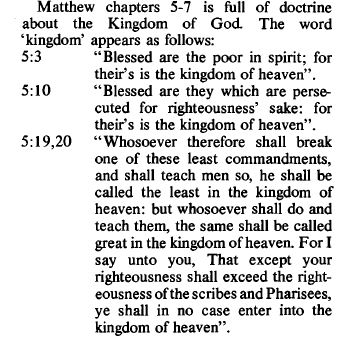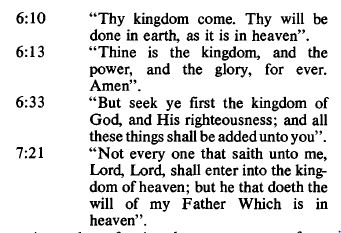“Seek Ye First the kingdom of God”: is this doctrine or is it practice? The phrase comes in Matthew 6:33 in the middle of the Sermon on the Mount, when Jesus’s disciples came to him and “he opened his mouth, and taught them, saying. . . “(Mt. 5:1,2). When he had ended these sayings (RV “words”) “the people were astonished at his doctrine: for he taught them as one having authority, and not as the scribes” (Mt. 7:28,29). The Greek words for “taught” and “doctrine” are different forms of the same word, and so it is apparent that” seek ye first the kingdom of God” is ‘doctrine’ because Jesus ‘taught’ it.
But does not “seek” imply something ‘to do’? Jesus himself explains that the wise man both hears and does his sayings, building his house upon a rock, whereas the foolish man who only hears but does not do the words builds his house upon sand, and “great was the fall of it” (Mt. 7:24-27). We conclude, then, that a question which puts doctrine and practice at opposite ends of a seesaw, to be ‘balanced’ against one another, is itself built upon sand. It falls down because Jesus’s words are doctrine, and that doctrine is to be done.


A number of points become apparent from these nine uses of ‘kingdom’, which describe the kingdom we should be seeking. First, the kingdom in question is God’s (“Thy kingdom come”, “Thine is the kingdom”), as opposed, for example, to the first kingdom in the Bible, which was Nimrod’s: “the beginning of his kingdom was Babel” (Gen. 10:8-10). God’s kingdom was the kingdom of Israel.
From the Exodus “there was a king” in Israel (Deut 33:5, RV mg.), the Lord their God (1 Sam. 12:12), and when the people asked for a king, to be like all the nations, they rejected God, that He should not reign over them. (The word ‘reign’ is the verb form of ‘king’ in both Hebrew and Greek, i.e. it means ‘to be king’). Nonetheless the kings of Israel sat on “the throne of the kingdom of the Lord over Israel” (1 Chron. 28:5). Because of wickedness and profanity this kingdom was overturned in the time of Zedekiah, to “be no more, until he come whose right it is; and I will give it him” (Ezek. 21:25-27).
The man “whose right it is” is Jesus, the son of God (Lk. 1:30-33), but he did not come to “restore again the kingdom to Israel” in his first ministry, because the time was not ripe (Acts 1:6,7). He ascended into heaven instead (Acts 1:9-11). But he “shall so come in like manner”, and then God will give him the crown (Ezek. 21:27), and will give him the throne of his father David, and he will be king over the house of Jacob for ever (Lk.1:32,33).
The Kingdom we ought to seek, then, is God’s. But it is a Kingdom He will give to Jesus; and not only to him, but to all who are poor in spirit, and who are persecuted for righteousness’ sake, for theirs is the Kingdom of heaven (Mt. 5:3,10). They are the ones who do the will of Jesus’s Father which is in heaven, in contrast to those who do not, while calling Jesus “Lord” and claiming to have done many wonderful works in his name (Mt. 7:21,22).
Evidently the type of people to whom God will give His Kingdom shows us what God’s Kingdom will be like. His will shall be done on earth, as it is in heaven (Mt. 6:10). In his Kingdom whoever breaks one of the least commandments of the law and the prophets, and shall teach men so, shall be called least: but whosoever shall do and teach them shall be called great (Mt. 5:17-20). The Kingdom given to the sons of God who strive to be “perfect, even as (their) Father Which is in heaven is perfect” (5:48), will be a Kingdom whose qualities are God’s.
But what has the description of the Kingdom which is yet to come got to do with how we should live now? Much every way. A key passage here is Romans 14. Verse 17 couples righteousness with the Kingdom of God, as in Matthew 6:33, from which our title is taken, and says: “the kingdom of God is not meat and drink; but righteousness, and peace, and joy in the Holy Spirit”.
This is a statement about what the Kingdom of God is, i.e. what it will be like when He sets it up. But look at the context; verse 15 reads: “But if thy brother be grieved with thy meat, now walkest thou not charitably. Destroy not him with thy meat, for whom Christ died. Let not then your good be evil spoken of; for the kingdom of God is . . . “. The apostle is commanding the brethren to walk in a certain way then and there, because of the nature of the Kingdom of God. A description of what the Kingdom will be like generates a moral obligation, a commandment to be obeyed before the Kingdom is setup. We have to display the qualities of the Kingdom now.
This feature is also seen in the Sermon on the Mount. In Matthew 5:33-37 Jesus commands: “Swear not at all . . . neither by Jerusalem; for it is the city of the great King”. Again, a description of a facet of the Kingdom (in this case, what its capital city is) causes (“for”) an obligation (in this case, not to swear by Jerusalem). The nature of the Kingdom of God creates the way we ought to walk today.
This last point can be generalist as follows: doctrine which is not itself explicitly teaching us what to do (and some would call this doctrine ‘academic’ or ‘theological’) does actually produce doctrine telling us what to do. And this is not just true of doctrine describing the Kingdom of God; for example: “if God so clothe the grass . . . Therefore take no thought” (Mt. 6:30,31). The fact that God clothes the grass gives rise to the command to take no thought. Doctrine not ostensibly about how we should live is about how we should live, in that it generates what we should do.
The Kingdom to come, then, is God’s, and will be given to those who do His will, who both hear and do the doctrine which is according to godliness (1 Tim. 6:3). Moreover, it is a Kingdom which is to come (Mt. 6:10). It has not come yet, as is evident from the fact that those who shall “reign on the earth” (Rev. 5:10) now may suffer reviling, persecution or evil speaking (Mt. 5:11), apart from the fact that Jesus is still in heaven. And this is behind the commandment to “seek” the Kingdom of God, because one does not seek what one has already found.
This point is apparent in the way the word for “seek” used in Matthew 6:33 is used elsewhere. It is first used in Matthew 2:13, where we are told that Herod would “seek the young child to destroy him”. He had not found him yet. So what did he do? He “enquired . . . diligently” of the wise men, and killed all the children up to two years old (vv. 7, 16). The whole reason for his seeking was to find, and to find what he had not already found. It is not just a state of mind, it is something a man does diligently. The man whose sheep went astray “goeth into the mountains, and seeketh . . . “(Mt. 18:12). Seeking the Kingdom of God, then, is not just a desire for it to come; it is a going about to ensure it will be ours, to ensure we obtain it when it comes.
The immediate context of “seek ye first the kingdom of God” in Matthew 6:33 is the alternative: to seek mammon as the Gentiles do (vv. 24,32). “Mammon” is a curious word derived from a Hebrew word temunah, first occurring in Exodus 20:4 and translated “likeness”. In this and virtually all its uses it means the likeness of a god, either of the true God (as in Deut 4:12,15: Israel did not see the “similitude” of Yahweh at Sinai) or of man-made gods, as here in the second commandment in Exodus 20. The point is that unlike the Kingdom of God, mammon can be “seen as yet”,and to serve mammon is to serve one of the Gentiles’ visible idols, “covetousness, which is idolatry” (Col. 3:5). What we ought to do with mammon is plain from its other New Testament use, in Luke 16.
We ought to use what we have to make friends with God and the Lord Jesus, so that when the Kingdom comes they will receive us into it: “Make to yourselves friends by means of the mammon of unrighteousness; that, when it shall fail, they may receive you into the eternal tabernacles” (Lk. 16:9, RV). The mammon will fail, the Kingdom will not.
The way to serve mammon is to care about it. The repeated focus in Matthew 6 is on taking thought (vv. 25,27,28,31,34); we are not to take thought about food, drink or clothing. And if this is true for the things we need (v. 32), how much more so for what we do not need! Jesus uses the same word later, in the parable of the sower (Mt. 13:22), where the seed, the word of the Kingdom (v. 19), is choked in a man’s heart by the care of this world (or age—Gk. aion) and the deceitfulness of riches. The man is barren. The care is of this age, the fashion of which is passing away (1 Cor. 7:31), rather than the age to come, whereof we speak.
But perhaps we can seek the things we need, provided we seek the Kingdom first? Perhaps we can seek them second? By no means. The point in Matthew 6:33 is not this, but that if, first, we seek the Kingdom, then, second, God will add all these things. He will clothe us (v. 30); He will give us this day our daily bread (v. 11). Working for a living is just a way of receiving what God gives; we ought not to care about it, we ought not to seek it. So do not serve mammon; do not seek the visible things as the Gentiles do. God will add what we need, if we seek His Kingdom and His righteousness. “Seek, and ye shall find . . . for . . . he that seeketh findeth” (Mt. 7:7,8).
